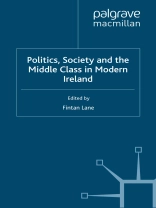An examination of Irish society and politics, providing a wide-ranging introduction to the involvement of the middle classes in Irish political life and the public sphere accrosss the eighteenth and twentieth centuries. Combines analytical surveys and case/area studies to offer new perspectives on crucial movements and figures in Irish history.
Tabela de Conteúdo
Notes on the Contributors Introduction; F.Lane The Men of Property: Politics and the Languages of Class in Ireland in the 1790s; J.Smyth William Thompson, Class and his Irish Context, 1775-1833; F.Lane The Rise of the Catholic Middle Class: O’Connellites in County Longford, 1820-50; F.O’Ferrall ‘Carrying the War into the Walks of Commerce’: Exclusive Dealing and the Southern Protestant Middle Class during the Catholic Emancipation Campaign; J.Hill The Rise of Middle-Class Cultural Values and the Decline of Duelling in Ireland; J.Kelly ‘You’d be Disgraced!’ Middle-Class Women and Respectability in Post-Famine Ireland; M.Cronin Middle-Class Attitudes to Poverty and Welfare in Post-Famine Ireland; V.Crossman The Industrial Elite in Ireland from the Industrial Revolution to the First World War; A.Bielenberg ‘Another Class’? Women’s Higher Education in Ireland, 1870–1909; S.Paseta Class, Nation, Gender and Self: Katharine Tynan and the Construction of Political Identities, 1880-1930; A.L.S.Annat Leadership, the Middle Classes and Ulster Unionism since the Late-Nineteenth Century; N.C.Fleming William Martin Murphy, the Irish Independent and Middle-Class Politics, 1905–19; P.Maume Planning and Philanthropy: Travellers and Class Boundaries in Urban Ireland, 1930–75; A.Bhreatnach ‘The Stupid Propaganda of the Calamity Mongers?’ The Middle Class and Irish Politics, 1945-97; D.Ferriter Index
Sobre o autor
FINTAN LANE is a former editor of
Saothar, the journal of Irish labour history. His publications include
The Origins of Modern Irish Socialism (1997),
In Search of Thomas Sheahan: Radical Politics in Cork, 1824–1836 (2001) and, as co-editor,
Politics and the Irish Working Class, 1830–1945 (2005).












